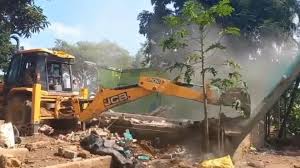Eviction drive aftermath turns violent in Assam, 1 dead, 10 policemen injured

Goalpara, Assam – July 17 – A government-led eviction operation in Assam’s Goalpara district took a violent turn, resulting in the death of one civilian and injuries to ten policemen. The incident has sparked political outrage and intensified concerns over the humanitarian cost of the ongoing land clearance drive.
Tensions Escalate During Forest Clearing
The conflict began early Thursday when security forces returned to the Paikan Reserve Forest. Although the initial eviction took place on July 12, many evicted families continued to live nearby in makeshift shelters. Authorities claimed they needed to remove these temporary structures. However, when officials approached the settlement, locals began throwing stones at the police.
In response, the police opened fire. Three civilians were hit by bullets. One of them, Shakuar Hussain, later died from his injuries. The other two, including Kutubuddin Sheikh, were hospitalized in critical condition. Police officers, on the other hand, sustained injuries from stone-pelting and required medical care.
Evictions Continue Across Assam
This incident is part of a broader trend. Over the last month, the Assam government has intensified eviction drives across multiple districts. More than 3,300 people have already been displaced. In total, since 2021, authorities claim to have cleared 160 square kilometers of land, affecting nearly 50,000 individuals.
The government says these evictions aim to reclaim forest and government land from illegal encroachment. Nevertheless, activists and local residents argue that the operation targets Bengali-origin Muslim communities disproportionately. In many cases, families receive no advance notice, legal assistance, or relocation aid.
Political and Community Backlash Grows
As expected, the incident triggered sharp reactions. Leaders from Congress, AIUDF, and CPM accused the government of acting with communal bias. They also demanded an independent investigation into the police firing.
Furthermore, the Jamiat Ulama-i-Hind, a leading Muslim organization, visited the area shortly after the incident. The group offered humanitarian support and set up temporary shelters for the displaced. They also demanded compensation for victims’ families and called for strict action against officials responsible for the violence.
According to a spokesperson, “This is not just about land; it’s about dignity and justice. People were thrown out without proper warning, and now lives have been lost.”
CM Sarma Defends Police and Eviction Policy
Despite the criticism, Chief Minister Himanta Biswa Sarma defended the police action and the broader eviction strategy. He insisted that the government’s mission was to protect Assam’s land and natural resources from encroachers. In his view, the opposition’s criticism reflects political opportunism rather than genuine concern.
In a statement, Sarma blamed “illegal settlers belonging to one community” for most encroachments. Unsurprisingly, this remark drew condemnation from civil rights groups and political opponents, who saw it as an attempt to communalize the issue.
A Humanitarian Crisis Unfolds
Meanwhile, thousands of people remain stranded without food, water, or shelter. Many of them are now living under tarps or plastic sheets by the roadside. Children, older people, and pregnant women are suffering from exposure to rain and poor sanitation. Despite the dire conditions, government support remains minimal.
One evicted mother shared her story: “We built our home here ten years ago. Suddenly, everything was destroyed. We have nowhere to go and no one to help us.”
Moreover, local health volunteers have reported an increase in water-borne illnesses and respiratory infections. However, no mobile medical teams have reached the site so far.
Legal Experts Warn of Violations
Several legal experts have raised alarms about due process violations. According to Supreme Court guidelines, any eviction must follow a fair legal procedure, including prior notice, opportunity to appeal, and a concrete rehabilitation plan. In Assam’s recent drives, most of these conditions appear to have been ignored.
Consequently, human rights lawyers plan to file petitions in the Guwahati High Court, demanding an inquiry into the police action and compensation for victims. They are also calling for a moratorium on eviction drives until proper legal safeguards are in place.
What Lies Ahead?
The situation in Goalpara remains tense, with extra police forces deployed to maintain order. Many fear that more violence could follow if evictions continue without reform. The tragedy has not only shaken public trust but also highlighted deeper problems in Assam’s land governance.
While the state insists on reclaiming land for conservation and development, it must also uphold constitutional rights, ensure justice, and avoid triggering humanitarian disasters. Without a more inclusive, transparent, and humane approach, the risk of further unrest looms large.
Ultimately, this crisis isn’t just about land. It’s about identity, belonging, and the right to live in dignity. Unless all stakeholders—including the government, opposition, and civil society—come together to seek long-term solutions, Assam’s eviction drives may continue to divide rather than heal.






